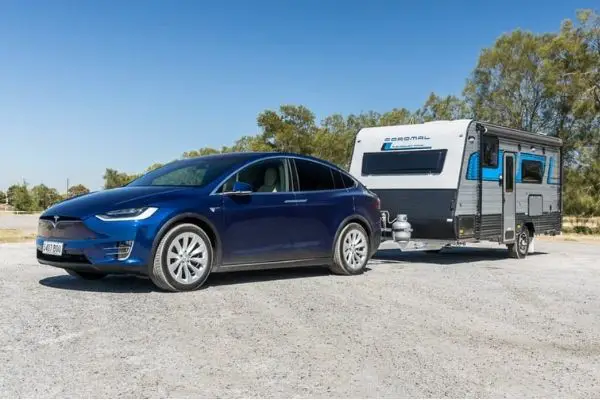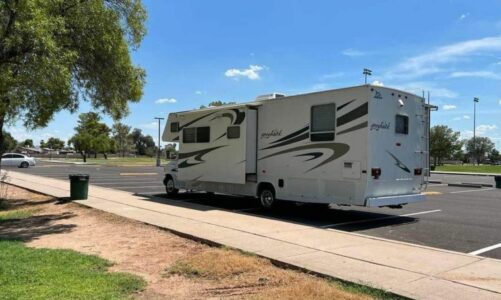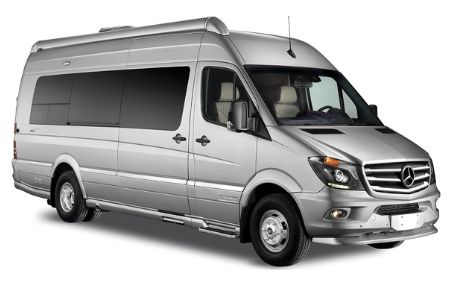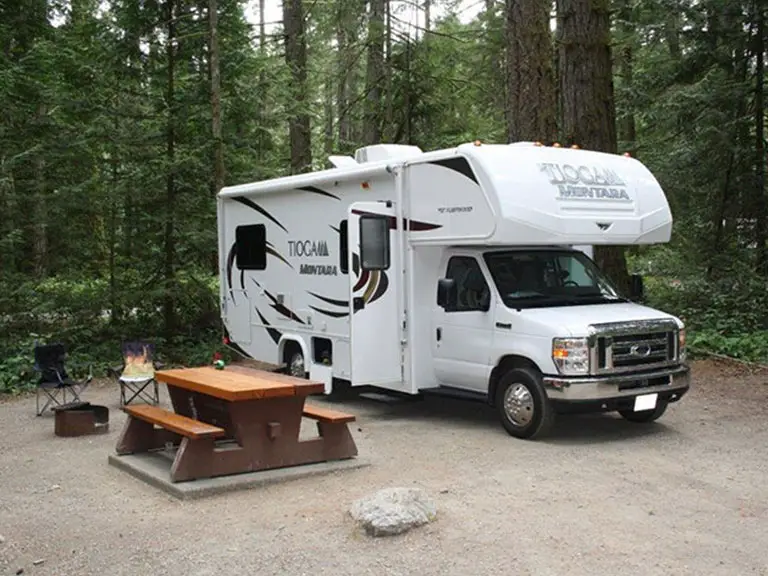Electric vehicles have become all the rage of late. For a variety of reasons, most manufacturers have begun to push the majority of their future vehicle R&D budgets toward the development of battery electric vehicles (BEVs), while substantially reducing budgets for new internal combustion engine development. There have even been several new brands launched into niche markets like pickup trucks that are attempting to capitalize on the hype surrounding BEVs.

These developments produce quite a quandary for the RV community which has a deeply vested interest in protecting our natural resources, and planet in general, while still maintaining effective and affordable modes of travel. While BEVs have made great advancements since their initial development in the early 1900s, they still make a terrible choice for RV travel today.
Let’s take a look at some of the issues facing BEVs as camper tow vehicles. For those who predominantly tow their campers short distances, or are looking to brave long-distance camper travel with a BEV, we’ll look at some specific options which may work for you.
Won’t I Help The Environment If I Tow My Camper With A BEV?
If you can charge your BEV entirely from renewable sources like solar or wind power then it will eventually have a smaller carbon footprint than your fossil fuel-powered vehicle. I say eventually because BEVs have batteries that are extremely carbon-intensive as well as exceptionally environmentally damaging to produce (and later dispose of).

Looking only at the amount of environmental destruction and carbon production necessary to get a vehicle to the showroom floor, gas-powered vehicles are much cleaner than EVs. As you drive them, EVs close the gap by not producing additional carbon. If you charge them from non-carbon emitting sources then they close that gap fairly quickly.
If you charge them off the power grid (as the vast majority of people do) then you would have to drive a 400-mile range BEV 400,000 miles to make up the CO2 production difference of a similar range gas vehicle.
EV batteries rarely last beyond 300,000 miles and replacing the battery will set your CO2 footprint back substantially. Essentially, a BEV with a 400-mile range that is charged from the existing power grid will always leave behind a larger CO2 footprint than a gas-powered car.
What Kind Of Range Can I Expect Towing With My Electric Vehicle?
The range is by far the biggest issue when it comes to using a BEV to tow a camper. You can expect a 50% – 75% reduction in total range when towing a trailer. That is a huge hit. For an electric vehicle with an advertised range of 300 miles, that cuts the range from 300 miles down to 75 – 150 miles.
This falls within a range because there are a lot of other factors that affect the total range including average speed, the aerodynamics of the trailer you’re towing, outside temperature, use of A/C or heat, battery age, terrain, and more. While those numbers are bad, they don’t tell the whole story.
Much like your gas-powered vehicle, you don’t typically drive an electric vehicle it’s full range. Usually by the time your fuel gauge drops to a quarter tank you’re looking for a place to stop and fill up. So with a gas-powered vehicle, you typically drive within 75% of its advertised range (100% down to 25% fuel tank capacity).
Battery-powered cars are somewhat different. Charging the battery to 100%, or draining it past 20% decreases the total life of the battery. While doing this occasionally won’t significantly shorten the battery’s life, repeatedly cycling it through the full range will. For this reason, it is accepted practice to only charge your EV to 80% and stop for a recharge before it passes 20%.
If you drive within that range while towing a camper you are effectively using only 60% of the battery’s capacity. That will cut your true range on a vehicle with an advertised 300-mile range down to 45 – 90 miles.
Can You Travel Long Distances Towing A Camper With An Electric Vehicle?
In theory, yes you could. The vehicle itself is perfectly capable of towing any camper that is within its acceptable towing capacity. The issue becomes the infrastructure and time necessary for keeping it charged. There are several issues you’ll face that make long-distance travel with BEVs towing a camper impractical or impossible.
- With a usable range typically less than 100 miles, charging stations would have to be available with at least that frequency. In fact, you would probably need charging station spacing of much less than 50 miles to make travel with a camper convenient. There are large portions of the US that don’t have gas stations with that frequency so there is little possibility that the infrastructure will be in place for long-distance BEV trailering any time soon.
- The vast majority of existing EV charging stations are designed for cars only. Most of them are back-in units that you cannot access with an attached trailer. Even if you can find a place to charge your trailer towing EV, there’s a high likelihood that you’ll have to detach your trailer and leave it somewhere nearby while you go into the charging station to fill up. This is incredibly inconvenient and adds significantly to the time and effort necessary to charge your vehicle.
- If you are unfortunate enough to run out of power while towing a trailer you will be in for a long wait and a huge bill. With the exceptionally short ranges these vehicles have towing, this scenario is a good possibility that has to be considered. Good Sam won’t be able to drive out a 5-gallon Jerry can of electricity to get you back on the road. Instead, you’ll have to be towed to a charging station. EVs can’t be towed with wheels on the ground. This means you’ll have to find, and wait for, an appropriate flatbed towing service to get your EV to a charging station. Depending on where you are and how you feel about leaving your camper behind, you’ll also likely need to have the trailer towed as well.
- Even if you had adequate charging station options along your route, the exceptionally short ranges coupled with long charging times will make travel slow and arduous. Real-world testing at a fast charger (151 kW) with a Rivian RT1 shows it takes about 40 minutes to charge from 20% – to 80%. Given the range restrictions while towing that could mean that for every 1 – 1.5 hours of driving you’ll have to stop for at least 40 minutes. If you have to remove your trailer to charge, you can add another 15 – 30 minutes to that depending on your hitch set up and where you can leave the trailer. Traveling 300 miles would take you at least 5 hours of drive time at 60 mph plus three 40-minute stops, or 7 hours assuming you can leave your trailer attached at each stop and you don’t make any other stops along the way. That would easily limit your travels to less than 300 miles a day assuming a normal long-distance travel day of 8 hours on the road.
Given these facts, there are very few places in the US where you can currently long-distance travel with a BEV towing a camper. You’ll essentially be limited to areas with a high urban density that has frequent charging station locations.
When Is An Electric Vehicle A Good Choice For Towing My Camper?
When it comes to RVing there are currently only two viable uses for battery electric vehicles. First is a BEV extra vehicle you tow behind your motorhome to use as your daily driver while the RV is in camp. There are currently no BEVs that can be flat towed or dollied so you’ll need a full trailer to take your BEV with you.
Next, BEVs work well for occasionally towing short distances. If you have a seasonal campsite down at the lake that’s less than 50 miles away, then your F-150 Lightning would be a good choice to get it there at the beginning of the season and bring it home at the end. It’s a short enough distance that you can make it on one charge and the truck is plenty capable of towing it.
BEVs That Can Tow A Camper
Let’s take a look at some BEVs which have the capabilities to tow a camper. Of these, only the Tesla Model X, Audi eTron, and Rivian RT1 are currently available for delivery.
- Tesla Cyber Truck – 14,000 lbs max tow rating. The Tesla Cybertruck is complete vaporware with no realistic date set when they will become available. While it does have a claimed towing capacity of 14,000 lbs and a range of up to 500 miles, those numbers are meaningless until units are actually rolling off the assembly line that can demonstrate those capabilities. Even if they do ship at some time in the future with those capabilities, expect the range towing a 4500lb trailer to be in the 75 – 100 mile range assuming operating the vehicle within the standard 80% – 20% state of charge range.
- The Rivan R1T- 11,000 lbs max tow rating. The Rivian R1T is currently “available”, however, they are delivering these vehicles at an exceptionally slow pace to customers who pre-ordered way in advance. If you’re not already in line to receive one then you may be waiting years to have a new unit delivered to your doorstep. The project range from around 200 – 400 miles depending on the battery/motor combination you select. Edmunds recently got 317 miles out of their R1T Launch Edition running in conserve mode (front-wheel drive) in a standard mileage test. Rivian states that, on average, they expect to see a 50% drop in range when towing the maximum load. Motortrend did confirm those numbers while towing a car on a trailer – which is a markedly more aerodynamic setup than your typical travel trailer. That translates to just under 100 miles of range when operating in the 80% – 20% state of charge range.
- Ford F-150 Lighting – 10,000 lbs max tow rating. Don’t let Ford’s marketing hype fool you, the F-150 lightning is not as capable of a tow vehicle as the gas F-150 is. While there are no F-150 Lightning’s being delivered to actual customers yet, a few people have been able to test their towing capabilities in the real world. CNET has published their results from a low-speed controller loop which indicated they could get 160 miles or so towing a 5,000 or 9,500 lb trailer with the extended battery pack option. This is around 50% of the published 360-mile range. In the article, they admit to having limited time, the relatively tame conditions of the test circuit, and that they were relying on the truck’s calculated energy usage to come up with their range estimates. Even if those numbers pan out, you are still limited to under 100 miles running in the 80% – 20% range.
- Tesla Model X – 5000 lbs max tow rating. The Tesla Model X is one of the only units that you can actually buy today, and it is one of the only Tesla models available with an optional trailer hitch setup. Towing capacity is pretty limited at 5000 lbs and you can expect the same severe range penalties as you approach that towing limit.
- Audi E-Tron – 4000 lbs max tow rating. The Audi Etron is available with up to a 350-mile range. The modest 4000 lb towing capacity will allow you to tow very small travel trailers safely. When towing near the max capacity expect real-world towing ranges to be in the 50 – 100 mile range at highway speeds when driving within the 80% – 20% state of charge range.
- Chevrolet Silverado EV – 10,000 lbs max tow rating. This is a new model projected for production starting with the 2023 model year. Published specs to date have the max range at 400 miles. Using our formula, we would expect the actual useable range while towing a camper to be in the 60 – 120 mile range.





